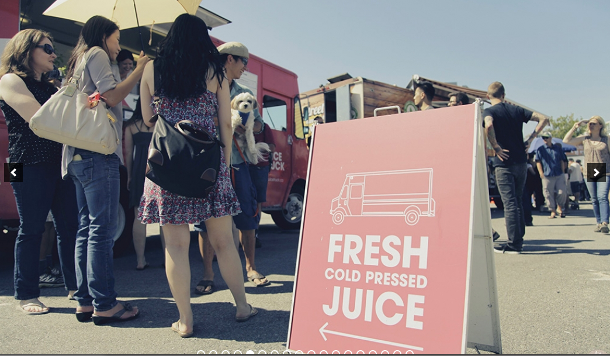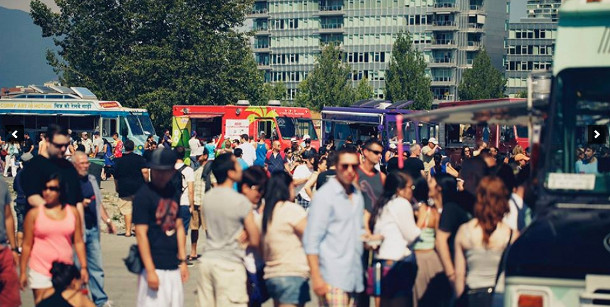Also in this Tyee Presents series:
CONTEST: Treat Your Friends to a Free Meal at Surrey's Food Cart FestivalAfter eight years in the food truck business, Mollie Small still vividly remembers her first day "in the field."
"I'd just finished building my wagon at 1 a.m., and I had to be on site at 8 a.m.," she chuckled. "I'd hired five staff -- way more than I needed. I was so naive about how things went that I didn't even realize I was allowed to be on the street with my wagon. I thought you had to be on the sidewalk. So there I am, at 8 a.m., trying to guide this trailer down the sidewalk, being navigated by a gal in front of me who's trying desperately to clear pedestrian traffic. Just a hilarious moment. I had no idea."
After close to a decade as the owner and operator of Mollie's Minis, a food truck that sells gourmet mini-donuts and other fried treats, Small has seen a lot of changes in the industry. After the City of Vancouver opened the door to food trucks in 2010, the local streetfood landscape blew up. A slew of competitors entered and exited the market. And Small steadily grew her own business, touring her two carts to events and weddings across the Fraser Valley.
But despite the growth, and Vancouver's recent designation as the "Third Best Streetfood City in North America," Small and other vendors warn that when it comes to the future of local food trucks, the region might be in for a bumpy ride. While popular, due to costly regulations many trucks never become genuinely profitable.
"The future of food trucks is one of three things," said Steve Ewing, president of the Streetfood Vancouver Association. "You either have a great location; it's part of another business; or it'll be a part-time job. That's the way food trucks are going... I don't think it's going to be the little guys anymore."
As the owner/operator of Yolks, Ewing has been in the food truck business since 2012, overseeing a truck, cart, restaurant and several commissary spaces. Both he and Small agree that while the rise of the Lower Mainland's mobile food industry has been meteoric, it has come with a price.
"I view it as perhaps having been too rapid," Small said. "Things that develop a little more slowly and steadily have longer lasting-power than things that become wildly popular very quickly. So we're going to get a lot of people who now have dreams of being a food truck owner, and want to get a piece of this pie that really doesn't exist. And there's going to be a lot of attrition because of it."
Shifting gears
Cruising into the public sphere back in 2010, food trucks were lauded as a cheaper, easier alternative to owning a full restaurant, a way for budding entrepreneurs to get into the game without the hefty investment that comes with a bricks-and-mortar facility. The only trouble is, as most vendors agree, that's not necessarily the case.
In addition to building or buying the trucks themselves (at a cost of $150,000 or more), vendors are required to obtain business licenses for each city in which they operate, as well as complete each municipality's required electrical, gas, and fire inspections. Then there are permit fees for street locations and festivals, along with the overhead that comes with any food service business: staffing, inventory, and equipment. Add in gas and maintenance, Ewing and Small noted, and it can amount to more or less the same as a storefront operation.
"People come to an event and see you're busy and think: 'Wow, I've got to get into this.' But what they don't see is that you might walk out of an event with only 10 per cent of what you make. Ultimately, it's not the revenue you generate -- it's what you get to keep," Small said. "You have to really learn to pick and choose your places and your events, and it's difficult to trend anything. I've told people: 'It's probably less risky to play the stock market.'"
Vancouver Coastal Health also mandates that each truck prepare its wares in a commissary kitchen, a commercial kitchen space that's either leased or shared. That can add more than $30,000 to a vendor's annual operating costs. The location of commissary space is also restricted by city zoning bylaws, and as a result many existing locations are already full to the brim. Consequently, many up-and-coming food trucks are tied to existing restaurants, including Tacofino, Via Tevere, and Vera's Burger Shack -- self-sufficient businesses that already have kitchen space of their own.
"We're probably the first city in the food truck world that required a commissary kitchen," Ewing said. "In Portland, you can work right out of your truck. You can plug it in at your house."
In early 2015, the City of Vancouver stopped issuing permits to new street vendors, slowing down the industry's growth for the foreseeable future. For Fraser Valley food cart operators, it's been harder still; municipalities like Surrey and Abbotsford don't have roadside permit programs, leaving the region's food trucks to either partner with an existing business (often setting up in their parking lot), or concentrate on events and festivals.

"Their entire livelihood is these types of events," said Laine Ogilvie, president of the Fraser Valley Food Truck Association and co-sponsor of this year's Surrey Food Cart Festival. "Especially for the Fraser Valley trucks. In their municipalities, they're not allowed to set up on the side of the road and just sell food. They do every event they can get their hands on, because it's the only way they're able to make money."
Putting pedal to the metal
In spite of these challenges, plenty of organizations are working to pick up the slack. Since its creation in early 2015, the Fraser Valley Food Truck Association has sponsored a series of roving food truck festivals around the Fraser Valley region. The Surrey festival, which takes place July 25 at city hall, is the association's fifth of the year. The festival is set to feature an artisan market, magicians, a beer garden, live music and face painting.
And although startup costs can be prohibitive for new vendors, some local financial institutions have stepped in to fill the void, providing creative funding opportunities in the form of micro-loans -- small, short-term loans with low interest rates.
"We had a huge flurry when the City of Vancouver first gave its approval. In that first year, I think we financed a dozen different food trucks," said Catherine Ludgate, community investment manager at Vancity credit union.
"We're continuing to provide micro-loans for new startup food trucks, because we think there's something very interesting going on here that there isn't a long track-record for yet. Someone might come in tomorrow with a new food truck or product that could really add to the local scene, and we want to talk about that with them. They won't have historical financials. They won't have a proven business. But that doesn't mean it's not worth doing."
Despite the struggles identified by Ewing and Small, precisely what the future holds for B.C.'s food trucks -- whether it stays permanently mired in costly regulations, or is able to evolve into a more Portland-esque model -- remains to be seen. But Small is careful to note that bumps in the road often have a hidden benefit.
"The people who are going to feel pushed out because of the costs -- we're going to find another solution," she said. "The only way this can sustain its popularity is if it can change. There has to be a new frame of mind for it to grow. We're going to find innovative ways of presenting something completely different. And that's something I'm looking forward to seeing." ![]()
Read more: Food, Urban Planning + Architecture
This article is part of a Tyee Presents initiative. Tyee Presents is the special sponsored content section within The Tyee where we highlight contests, events and other initiatives that are either put on by us or by our select partners. The Tyee does not and cannot vouch for or endorse products advertised on The Tyee. We choose our partners carefully and consciously, to fit with The Tyee’s reputation as B.C.’s Home for News, Culture and Solutions. Learn more about Tyee Presents here.

















Tyee Commenting Guidelines
Comments that violate guidelines risk being deleted, and violations may result in a temporary or permanent user ban. Maintain the spirit of good conversation to stay in the discussion.
*Please note The Tyee is not a forum for spreading misinformation about COVID-19, denying its existence or minimizing its risk to public health.
Do:
Do not: